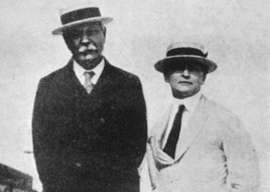
October 31, 2012

Sir Arthur Conan Doyle and Harry Houdini
Conan Doyle, who assumed Kingsley was referring to his earlier doubts about the paranormal, ended his account by saying that he had felt a strong hand press down on him, followed by a kiss on his forehead. “I am so happy,” his son assured him. Houdini listened politely but later remarked in his diary:
As a rule, I”ve found that the greater brain a man has, and the better he is educated, the easier it has been to mystify him.
Things went downhill from there. Within a year, the two men had become rival stars on the American lecture circuit and regularly clashed in the press. Houdini told the Boston Herald that he felt “very sorry” for Conan Doyle. “It is a pity that a man [should], in his old age, do such really stupid things.”
On June 18, 1922, Conan Doyle and Houdini met in a room at Atlantic City’s Ambassador Hotel. Doyle and his wife claimed that they sat around a séance table and that Houdini had produced 15 pages seemingly full of spirit writing by Houdini’s late mother. Doyle went on to write about this “wonderful revelation” in a series of press articles, while the “little chap” initially did nothing to contradict him. But then came one of those sudden reversals that constitute the basic fabric of the Conan Doyle-Houdini relationship. Apparently indignant at seeing his mother’s intimate words to him splashed across The New York Times, Houdini denounced the whole thing as “a flim-flam….There was not the slightest idea of my having felt my sweet mother’s presence.”
He went on to add a routine to his stage act in which he showed how “Doyle-like séances” owed more to a series of sliding panels, trap doors, bed sheets, and other props than they did to the feat of “spectral assistance and materialization” advertised. He mocked the idea that his dead mother would have communicated with him in fluent English, a language she had never spoken.
Conan Doyle in turn wrote:
I feel rather sore about it. I know by many examples the purity of my wife’s mediumship, and I saw what you got and what the effect was upon you at the time.
From then on it was war. Conan Doyle told the press that Houdini was denying what his own eyes had seen, and Houdini told them that Conan Doyle was senile. They soon began a fight-by-proxy over the claims of a Boston housewife named Mina Crandon that she could channel her late brother’s spirit. Houdini went to Boston and reported that the brother’s voice that had seemingly come through in the séance room was no more than a “mildly accomplished ventriloquism act.” Back in England, Conan Doyle stubbornly defended the woman he called “the most gifted psychic alive” from her “Hebrew critics.” Houdini told an audience from the stage of the Princess Theatre in Montreal that
Arthur Conan Doyle is just a writer of detective stories, and intellectually not a genius. If he were here in front of me, I would tear him to ribbons.
Houdini died on Halloween night 1926 after taking an ill-judged blow to his stomach from an admirer. Doyle immediately pressed Houdini’s widow to let him know the moment the “little chap” returned from the grave, although it seems he never did. At Conan Doyle’s own funeral service in 1930, a medium leapt to her feet to shout, “He is here! He is here!” while pointing to an empty chair in the hall. “Sir Arthur gave me a message”a personal one, which I gave to Lady Doyle,” the medium later told the press. “I saw him distinctly. He was wearing evening dress.”
Since both men have long since entered the afterlife, it’s hard to determine which one’s views on the supernatural were more accurate. It’s also difficult to tell whether they are still feuding in the spirit world. Neither Doyle nor Houdini responded to repeated interview requests for this article.